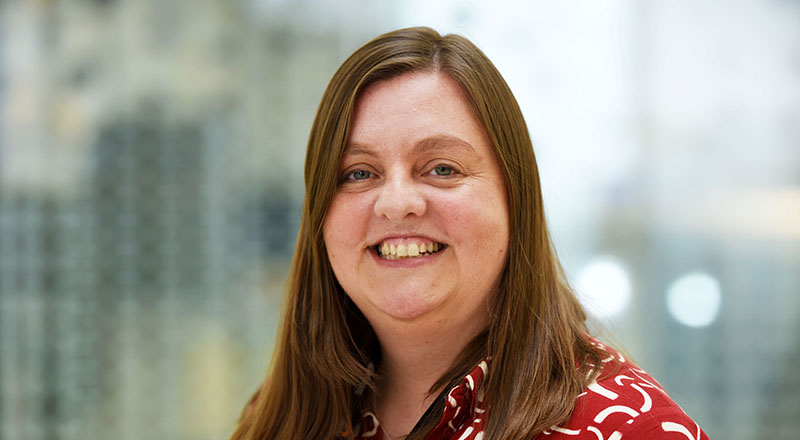
Academics based at the University’s National Horizons Centre have been studying the genetics of aggressive lymphoma and have discovered a link between a specific gene and the survival rate of children with the disease.
In a paper published in leading scientific journal Leukemia, the team, led by Professor Vikki Rand and driven by Dr Alex Newman, demonstrated that mutations on the TP53 gene on chromosome 17 is linked to an inferior survival rate of children with aggressive B-cell lymphoma.
As an important genomic marker of poor prognosis the research has made it possible to highlight patients who are less likely to be cured with current therapies.
As part of the study, Dr Newman, alongside Dr Peixun Zhou, Dr Masood Zaka and Ms Alex Blain, generated a cohort made up of patients from across the UK, collected with support from the Children’s Cancer and Leukaemia Group (CCLG). Using state-of-the-art sequencing analysis, the team identified a subset of patients that would benefit from treatment reduction to reduce the toxic side effects of chemotherapy, while maintaining a high chance of survival.
The team identified that TP53 mutations were associated with a worse outcome for children with this aggressive lymphoma. Patients without these mutations enjoyed excellent survival rates, despite not receiving immunotherapy which is now given to all patients regardless of their risk group.
Professor Vikki Rand, Director of Biosciences Research in Teesside University’s School of Health & Life Sciences and the National Horizons Centre (NHC), said: “Being able to identify which patients are more likely to respond to specific treatments and those which could suffer adverse reactions is absolutely vital to effective treatment of cancer.
“This research has successfully demonstrated how mutations on a specific gene can impact the survival rate of children.
“We now hope that this research can eventually be used to enable clinicians to tailor their treatments to ensure that children affected by this disease can maximise their chances of recovery.”
The National Horizons Centre is based at Darlington’s Central Park and is a National Centre of Excellence for the bioscience sector bringing together industry, academia and world-class facilities to deliver research, training and partnerships to deliver real-world impact.
This research truly embodies the National Horizons Centre’s mission statement of discovering diseases earlier, developing novel treatments and delivering life-saving medicines quicker, safer and more affordably.
Dr Alex Newman, Scientific Experimental Officer in Genomics at the National Horizons Centre, said: “The next step is to validate these findings in an international clinical trial. At the NHC we are using our cutting-edge facilities to develop a test to be used in a trial to screen for TP53 abnormalities and investigate how these alterations are driving relapsed disease.”
Dr Jen Vanderhoven, Director of the National Horizons Centre said: “This research truly embodies the National Horizons Centre’s mission statement of discovering diseases earlier, developing novel treatments and delivering life-saving medicines quicker, safer and more affordably.
“The work of Professor Rand and her team is destined to have huge impact on how we treat lymphoma in children.”
Rachel Kahn, Research Communications Manager at Blood Cancer UK, said: “While survival for many childhood blood cancers has improved substantially, there’s still more to be done until we see a day when all children survive the disease.
“This research is an excellent example of how we might be able to do this.
“We look forward to further research which will look at how useful this mutation will be at predicting how aggressive a child’s disease will be, but we hope that it will help to identify those who need additional treatment and those who can be spared treatment, to give every child the best possible chance of survival.”
Professor Rand’s research was supported by Blood Cancer UK, Little Princess Trust, the North East Promenaders Against Cancer (NEPAC), the Hannah Bloom Charitable Trust and the JGW Patterson Foundation.
An insight from Professor Rand for this work is available via the Nature Cancer Community “Behind the Paper” blogs talking about the power of a retrospective cohort and collaboration.
Research could herald new treatments for childhood cancer
Aycliffe Today, Web, 15/11/2021
Ground-breaking research led by staff at Teesside University could lead to new approaches in treating aggressive childhood cancers more effectively.
Research could provide new treatments for childhood cancer
Health Tech World, Web, 11/11/2021
Academics based at the University's National Horizons Centre have been studying the genetics of aggressive lymphoma and have discovered a link between a specific gene and the survival rate of children with the disease.